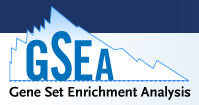
|
OverviewGene Set Enrichment Analysis (GSEA) is a computational method that determines whether an a priori
defined set of genes shows statistically
What's New6-Feb-2024: GSEA 4.3.3 released. This is a minor release to update the OpenJDK distribution included in the platform bundles, to pick up recent OpenJDK improvements, bug fixes, and security patches. See the release notes for details. 20-Oct-2023: MSigDB 2023.2 released. Introducing new subcollections from KEGG_MEDICUS and the Curated Cancer Cell Atlas (3CA), plus new user-submitted sets for C2 and M2 CGP. Updated with gene data from Ensembl 110. Human and Mouse collections for Reactome, GO, and WikiPathways have been updated. See the release notes for details. 13-Sep-2023: Our new publication describing the development of our Mouse-native MSigDB Collections is out now in Nature Methods! Go check it out! 20-Jul-2023: We have introduced a new interactive Compendia Expression Profiles tool using Next-Generation Clustered Heat Maps (NG-CHM) from the Department of Bioinformatics and Computational Biology at the MD Anderson Cancer Center. Unlike our static image tool, these heatmaps allow interactive exploration of the expression profile of MSigDB gene sets or user-defined gene lists (on our Investigate page). 24-Mar-2023: With the release of MSigDB 2023.1 we are introducing a SQLite database for the gene sets in both the Human (2023.1.Hs) and the Mouse (2023.1.Mm) resources. This new format brings the MSigDB contents and metadata with all of the searchability and manipulative power of a full relational database. See our documentation for more details on the contents and usage. 3-Mar-2023: MSigDB 2023.1 released. Updated to gene data from Ensembl 109. Human and Mouse collections for Reactome, GO, and WikiPathways have been updated, as well as HPO, Lung atlas sets from He et al. have been added to C8, and Uterine cell types from Zhang et al to M8, plus new user-submitted sets for C2 and M2 CGP. See the release notes for details. 2-Oct-2022: GSEA 4.3.2 released. This is a minor release to fix a bug on the species consistency check. See the release notes for details. 7-Sep-2022: Announcing the first release of Mouse MSigDB (v2022.1.Mm) with ~16,000 gene sets that can be used directly for GSEA analysis of mouse datasets without the need for orthology conversion. A new release of Human MSigDB (v2022.1.Hs) includes updates to Reactome, GO, HPO, and WikiPathways. See the 2022.1.Hs release notes and 2022.1.Mm release notes for details. 7-Sep-2022: GSEA 4.3.0 released. Adds support for convenient access to the new Mouse MSigDB database and makes adjustments for our new versioning scheme. See the release notes for details. Follow @GSEA_MSigDB |
License TermsGSEA and MSigDB are available for use under these license terms. Please register to download the GSEA software, access our web tools, and view the MSigDB gene sets. After registering, you can log in at any time using your email address. Registration is free. Its only purpose is to help us track usage for reports to our funding agencies. Citing GSEATo cite your use of the GSEA software, a joint project of UC San Diego and Broad Institute, please reference Subramanian, Tamayo, et al. (2005, PNAS) and Mootha, Lindgren, et al. (2003, Nature Genetics). FundingGSEA and MSigDB are currently funded by a grant from NCI's Informatics Technology for Cancer Research (ITCR) |